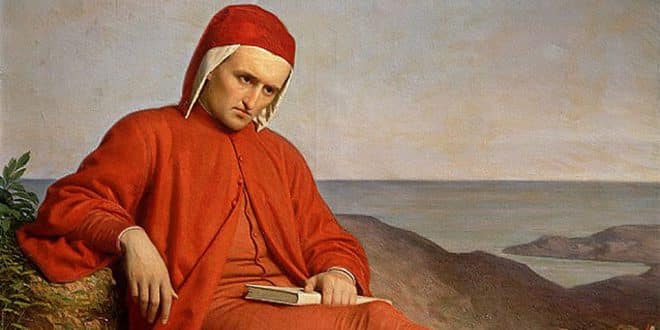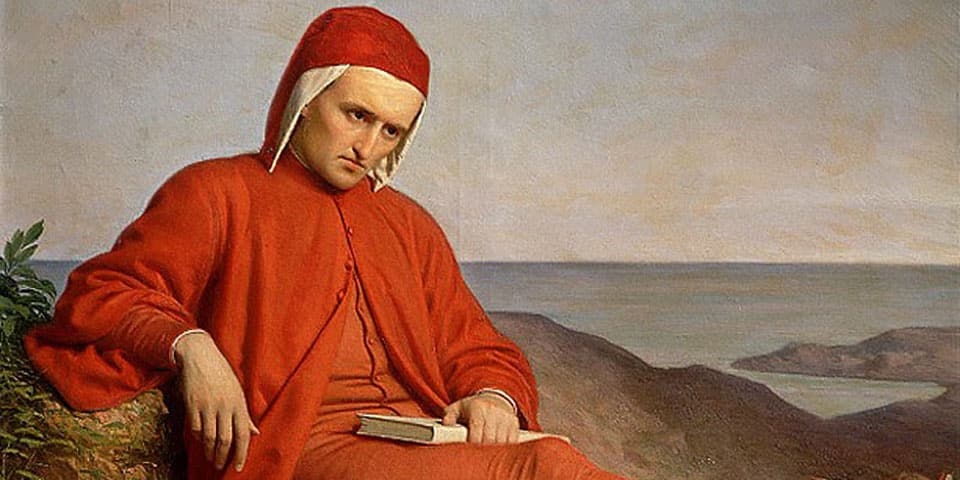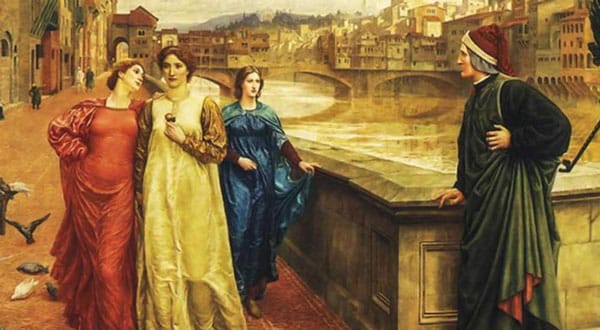Dante Alighieri was one of the most prominent poets and thinkers of the Middle Ages who shaped the development of pan-European culture. His work played an important role in the formation of the Italian literary language.
Surprisingly his poetry and his philosophical picture of the world of this extraordinary, deeply thoughtful and highly sensitive man has remained current and interesting for more than seven centuries.
Page Contents
Biography
Little information has survived about Dante Alighieri’s fate that is corroborated by documentary sources. One of the first people to investigate the poet’s life was the distinguished writer of the Early Renaissance, Giovanni Boccaccio. On the basis of his works and Alighieri’s own autobiographical texts numerous scholarly works of historians of subsequent eras were carried out.
The twists and turns of Alighieri’s fate, and the formation of his worldview, have to be seen only through the prism of the tumultuous political battles in medieval Italy. At the turn of the thirteenth and fourteenth centuries, the region was fragmented into many small city-states and principalities. Dante and his contemporaries lived through a difficult period, characterized by a lack of unity of power and constant confrontations between papal and imperial rule. The unceasing political turmoil largely set the tragic tone of the poet’s life journey.
Origins
The approximate date of birth of Dante Alighieri is thought to be 1265. He was born in Florence, one of the most advanced cities in Italy. According to tradition the ancestors of the great poet came from a noble and wealthy Roman family, and played a major role in the formation of the Tuscan capital. Extant manuscripts show that Dante’s great-grandfather belonged to the aristocracy and was knighted.
Education
Opinions of researchers of the poet’s biography regarding his education are extremely contradictory. According to one version in the 80s of the XIII century Dante was a student at the University of Bologna (Università di Bologna) – the most prestigious institution of Europe. Alighieri’s creative legacy testifies to the high level of his enlightenment: he was familiar with the works of ancient authors and literary works of his contemporaries, had an excellent orientation in the natural sciences, and throughout his life he was incessantly engaged in self-education, comprehending new horizons.
Dante’s chief teacher and mentor, whose name is mentioned with great reverence by the poet himself, was Brunetto Latini, a Florentine literary man, scholar, encyclopedist and prominent politician.
Creation – early stage
It is not known exactly when Alighieri got interested in writing. Researchers of his texts claim that he was influenced by the poems of the famous Italian poet Guittone d’Arezzo, although Dante himself later denied this fact.
A special role was played by the literary school of Dolce stil nuovo, whose characteristic feature was the chanting of unearthly love for women and the philosophical vision of a higher divine essence in the majestic image of the beloved. It is not without reason that the name of this direction of poetry is translated from Italian as “sweet new style”. Alighieri considered the brilliant representatives of unusual verse forms for that time, Guido Cavalcanti and Guido Guinizelli, not only friends, but also his main teachers of poetry.
Dante’s first collection of works, consisting mainly of sonnets and a small fragment of prose text, was published around 1283-1293. The book was written in Italian and was entitled La Vita Nuova (The New Life). Alighieri’s debut works encapsulate all the elements of Dolce Vita Nuovo:
- The elegance of verbal forms;
- The spiritualization of the feeling of love;
- The philosophical undertones;
- The mysticism and complexity of the images;
- Rhetoric.
Alighieri himself admitted that his birth as a poet was due to a deep and reverent feeling for a woman whose image he treasured in his soul throughout his life. The name of his beautiful beloved, Beatrice, was immortalized by Dante, making it virtually legendary.
Love and family
Beatrice Portinari was the poet’s one and only true muse. Alighieri’s passionate feelings, close to deification of his object of passion, became a textbook example of deep platonic love. Unfortunately, little documentary evidence has survived to reveal the veil of this woman’s identity. As Giovanni Boccaccio said, Beatrice was the daughter of a famous Florentine banker who lived next door to the Alighieri family.
The second time they met and talked on a street in Florence, years later, when the young beauty was already a married lady, and love for her Dante inflamed with greater force. Beatrice died early, at age 24-25 years, and this event became a real tragedy for a young man, almost ended in his own death.
One or two years after the death of his beloved, Alighieri married Giemma da Manetto Donati, daughter of an influential politician. It was a marriage of convenience, rather typical of the era. The couple had two sons and a daughter. The couple were separated for most of their lives. It is noteworthy that Alighieri did not mention his wife’s name in any of his works.
Involvement in political life
Following the family tradition, Dante Alighieri was an active participant in events in the political arena of Florence. The first mention of him as a statesman dates back to 1296 – 1297 years. Not indifferent to the fate of his native region, Dante was often promoted to honorary positions, participated in law-making and carried out difficult diplomatic missions. Between 1300 and 1301 he was elected to the college of priors (an authority similar to the modern city government).
A fierce struggle developed between two opposing political forces: the Guelfi, who favored the unity of the country and the pontiff’s conciliatory influence, and the Ghibellini, who supported the power of the Holy Roman Emperor.
Later on, there was a split in the party of supporters of the pope, which dominated the city: it was divided into “blacks” and “whites. The first still supported the clergy and the second favored the independence of the Republic of Florence (Repubblica fiorentina) from the edicts of the higher clergy and counted on the strengthening of the monarchy. Alighieri belonged to the “white” faction of the Guelphs, which remained the ruling force until the military coup of 1302.
Wanderings
During the nearly 20 years of exile, until his death, Dante Alighieri wandered in various parts of Italy and did not give up hope of returning to his homeland, but all his attempts proved futile. Full of anxious feelings he continued to create his great works even in conditions of wandering existence. The poet lived in Verona, under the patronage of the condottiere Bartolomeo I della Scala and later moved to Bologna, Lunigiana. Between 1309 and 1310 Alighieri took up residence in Paris, but after a short period he left France.
At this time the German king Henry VII undertook a campaign to Italy, obsessed with the idea of restoring full imperial power there. He granted amnesty to all exiles of opposing parties and tried in every way to reconcile the competing aristocratic clans. Dante, who saw in a strong monarchy the salvation of Italy, was imbued with another hope of returning to Florence. However, Henry VII died in 1313 (many historians are inclined to believe that he was poisoned), and with the death of the emperor weakened the exile’s prospects of regaining his homeland.
According to some sources, Dante was invited to return to a city dear to his heart on condition of a public renunciation of political ideals, but proud and true to his convictions Alighieri refused to undergo the humiliating procedure.
In 1315, the senoria imposed a second death sentence, and with it his dreams of Florence were forever dashed. In 1316-1317 the ruler of Ravenna, Guido Novello da Polenta, received Alighieri, offering him a position at his court.
Art in the period of maturity
In the works produced during his period of exile, Dante acted as a researcher, literary scholar, educator, philosopher, and theologian. He wrote treatises on the vernacular, socio-political problems, the principles of morality of medieval society, and questions about the properties of the soul and the intellect. The bibliography of Alighieri’s works includes the following works:
- An unfinished philosophical treatise, The Feast (Convivio), written around 1306, which laid out a critique of moral and ethical standards and attempted an in-depth analysis of poetics and linguistics;
- De vulgari eloquentia libri duo (On the eloquence of the people), written between 1303 and 1305, an incomplete linguistic treatise, which constitutes the first European study of the origin and development of Romance languages, as well as an analysis of the author’s contemporary literary forms;
- The treatise “Monarchy” (De Monarchia), consisting of three parts, written in 1312-1313 in Latin, which describes the ideal, from the author’s point of view, socio-political system;
- The poem La Divina Commedia (The Divine Comedy), written between 1306 and 1321, considered the pinnacle of his career.
The Divine Comedy
The Poem of the Comedy, later called “The Divine” (i.e., “the magnificent”) by Giovanni Boccaccio, is among the best works of world literature.
Dante worked on it for nearly 15 years and managed to finish the last lines shortly before his death. The first printed edition appeared in 1472. The work consists of three parts, each of which includes 33 songs:
- Hell;
- Purgatory;
- Paradise.
In the text of the poem one can find both commonplace expressions and high-sounding vocabulary of literary language. The peculiarity of style is an abundance of allegorical symbols, filled with deep semantic intensity, picturesqueness, realism and drama. All events are narrated in the first person.
The plot is based on the mystical story of the hero, who, after the death of his beloved, embarks on a journey through the afterworld in which he passes through the nine circles of hell, purgatory and the spheres of paradise. As he wanders, Dante meets his contemporaries and famous figures of past eras with all their joys and sorrows, political convictions and passions in life, and, from a humanist and sage perspective, makes a moral assessment of the deeds he has committed.
Literary scholars have had different interpretations of the Divine Comedy over the centuries, but what has always remained constant is the great value of this work of genius: Alighieri’s poem is an encyclopedia of the political, cultural, religious and scientific life of the Middle Ages.
Death
Dante died in 1321 of malaria, having contracted the deadly disease while returning from a trip to Venice (Venezia), where he had come on a peacekeeping mission as ambassador of the ruler of Ravenna. Alighieri was buried in the Basilica di San Francesco with great honors, worthy of a great citizen of his country. Later his ashes were transferred to a mausoleum near the church, the so-called Tomb of Dante.
 Italy for me From Italy with love
Italy for me From Italy with love



